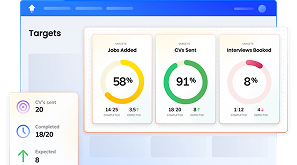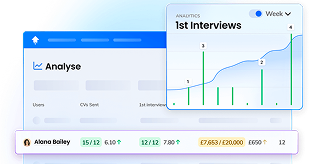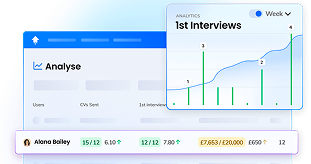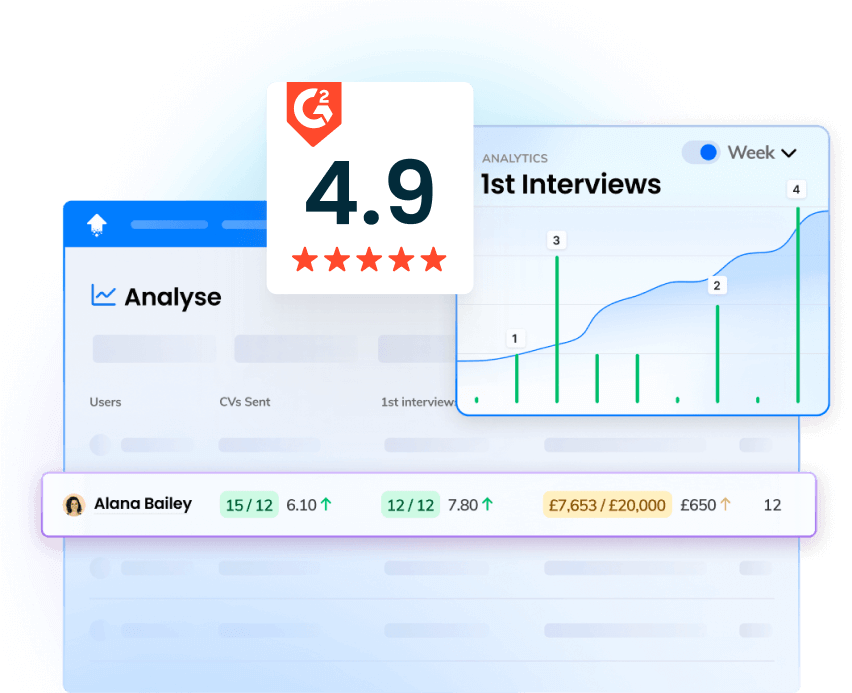Artificial intelligence is rocketing in recruitment, and it's easy to see why.
This cutting-edge tech greatly benefits recruitment agencies, helping teams save time and money while delighting their clients and candidates.
AI works well in recruitment because recruiters' day-to-day jobs typically involve many administrative and repetitive tasks, from parsing CVs and messaging passive candidates to answering FAQs and analysing data.
And this is where AI shines.
There are a wide variety of advanced AI-powered tools on the market designed to handle various repetitive recruitment tasks.
This frees up your (human) recruiters to get on with the high-value work they're best at, such as building client and candidate relationships.
Other benefits of using AI in recruitment include reducing bias in the hiring process, improving candidate quality, and significantly cutting time-to-hire.
And all of this helps to boost client satisfaction.
The Role of AI in Recruitment – A Market Overview
AI Adoption Trends in Recruitment
Almost 90 per cent of leaders anticipate that deploying AI will drive revenue growth in the next three years, according to a 2025 McKinsey report.
Furthermore, 78 per cent of professionals surveyed by McKinsey say their organisations already use AI in at least one business function.
So, how are recruiters using AI-driven platforms?
AI-powered recruiters are already deploying these tools for:
➡️ Automated CV screening and shortlisting
➡️ AI-Powered chatbots and candidate engagement
➡️ Bias reduction and fairer hiring
➡️ Predictive analytics for better hiring decisions
➡️ Video interview analysis and AI assessments
It's important to note, however, that not every recruitment business has adopted AI, with smaller agencies more likely to be put off by skill and cost barriers.
If you'd like to reap the benefits of AI but don't have the budget, look out for free trials (many software companies offer these), free tools (ChatGPT, for example) and free AI courses.
What AI Does (And What It Can't Do) in Hiring
The key to success when it comes to mastering AI in recruiting is to use these tools for the tasks they excel at.
Remember — they should complement human strengths, not attempt to take over tasks that humans are indisputably best at.
So let's break down exactly where your agency should be using AI, and where you should be leaning on human recruiters.
AI Is Great At ⬇️
✅ CV screening – Rapidly scanning and filtering CVs based on job criteria
✅ Job description optimisation – Analysing job descriptions and suggesting improvements to attract the right candidates
✅ Chatbots for candidate queries – Answering candidate questions in real-time
✅ Interview scheduling – Automating scheduling by syncing with candidates' and interviewers' calendars
✅ Candidate sourcing – Searching databases and social media platforms to identify potential candidates
✅ Skill and personality assessments – Evaluating candidates' skills, cognitive abilities, and cultural fit
✅ Data analytics - Automating the collection and analysis of data relating to recruiters' goals
✅ Predictive analytics – Analysing past hiring data to predict which candidates are likely to succeed
✅ Onboarding assistance – Helping new employees with paperwork, training schedules and FAQs
✅ Bias reduction – Helping to reduce unconscious bias by focusing on skills and experience
✅ Employee retention analysis – Analysing trends in employee departures and suggesting ways to improve retention
What do all these tasks have in common?
They're all repetitive, time-consuming, administrative tasks.
And by handing them over to AI, they will get done quickly and more accurately.
So, when looking at tasks humans should perform, we're looking for jobs that are not repetitive, time-consuming, and administrative.
Humans Are Great At ⬇️
✅ Building relationships with candidates – Establishing trust and understanding candidates' motivations
✅ Conducting in-depth interviews – Human recruiters can better assess personality, cultural fit, and emotional intelligence than AI.
✅ Handling sensitive conversations – Discussions around salary negotiations, career aspirations, and personal circumstances
✅ Decision-making on hiring – While AI can assist, humans who understand company culture and team dynamics should make final hiring decisions.
✅ Providing personalised feedback – Constructive feedback should be tailored to each candidate
✅ Adapting to unique situations – Every candidate and role is different, requiring human judgement
✅ Employer branding and storytelling – Sharing authentic stories about company culture, values, and career growth opportunities.
✅ Managing team dynamics – Ensure new hires complement existing teams beyond their technical skills.
✅ Onboarding with a human touch – Welcoming new employees and making them feel valued goes far beyond automated processes.
✅ Ethical and inclusive hiring decisions – Humans must ensure that recruitment is fair, inclusive, and aligned with company values.
How AI is Used in the Recruitment Process – 5 Key Applications
Now, let's take a deeper look at five of the most popular AI use cases in recruitment.
Where are recruiters using AI in their day-to-day processes, and how exactly are they going about this?
1. AI-Powered Candidate Sourcing & Talent Matching
Some of the most exciting AI-powered tools help recruiters with AI candidate sourcing and talent matching.
This recruitment software harnesses the power of machine learning and data analytics to identify the best candidates for a job — so you don't have to!
Here's how it works.
AI scans job boards, social media, and internal databases to find suitable profiles based on skills, experience, and qualifications.
Many tools are also able to make job postings across multiple jobs boards.
Natural Language Processing is used to analyse CVs and job descriptions for precise matches.
What's more, AI can also predict a candidate's likelihood of success by assessing past hiring data and performance trends.
This is particularly exciting for recruiters looking to deliver better fits to their clients.
By automating the sourcing process, recruiters save time and gain access to a broader, more diverse talent pool while ensuring a better fit between candidates and job roles.
In other words, you get to build stronger teams without having to do all the legwork.
2. Resume Screening & AI-Powered Pre-Screening
Tired of sifting through mountains of CVs?
This recruiter mainstay could soon be a thing of the past with resume screening tools.
We know it sounds too good to be true!
AI enhances CV screening by quickly analysing large volumes of applications, filtering candidates based on keywords, skills, experience, and job requirements.
Furthermore, machine learning models assess job seekers' CVs for relevance, reducing manual workload and improving efficiency.
AI-powered pre-screening takes this further.
It can conduct initial screenings through questionnaires, video interviews with sentiment analysis, or skill-based tests.
It identifies top candidates and ranks your shortlist by analysing responses, tone, and even facial expressions!
This ensures only the most suitable applicants move forward, improving hiring speed while reducing bias and enhancing the overall candidate experience.
Let's not forget the other massive benefit: AI tools can analyse thousands of resumes in minutes, massively speeding up your processes and reducing time-to-hire.
3. AI-Driven Predictive Hiring
If used correctly, predictive analytics is the stuff of dreams for recruiters.
These tools analyse historical big data in recruitment, market patterns, and candidate behaviours to accurately forecast hiring trends.
To predict future needs for a specific company, these tools take into account factors such as:
- Past hiring success
- Employee retention rates
- Industry trends
Furthermore, agencies can proactively adjust their hiring strategies by identifying talent shortages, seasonal demand fluctuations, and emerging skill requirements.
Predictive analytics in recruitment also helps optimise sourcing channels, reduce time-to-hire, and improve decision-making by highlighting which candidates are most likely to succeed.
This data-driven approach enables recruitment agencies to stay way ahead of the competition and make more strategic, long-term hiring decisions.
4. Chatbots & AI for Candidate Engagement
How often has a great candidate slipped through your fingers simply because you did not have enough time to connect regularly with them?
With AI tools up your sleeve, this never needs to happen again.
Indeed, recruiters can leverage AI for candidate engagement by automating communication, personalising interactions, and improving response times.
AI-powered chatbots can handle initial candidate queries, provide job recommendations, and guide applicants through the hiring process.
They offer 24/7 support, ensuring candidates receive instant responses.
AI also enables automated follow-ups, sending personalised emails or messages based on candidate activity, such as application status or upcoming interview reminders.
Meanwhile, machine learning analyses engagement patterns and candidate sentiment to show you what works and what doesn't.
This helps recruiters optimise and personalise their communication strategies and identify when candidates may need additional support.
Furthermore, AI can streamline feedback collection, ensuring candidates feel heard and valued.
5. AI in Interview & Skill Assessments
AI enhances interviews and skill assessments by automating evaluations and providing data-driven insights.
So, how do AI-powered video interviews work?
These tools generally allow recruiters to pre-set questions for a candidate, who will then film a one-way video interview with these prompts.
The tool will analyse candidates' speech, tone, and facial expressions to assess confidence, enthusiasm, and suitability.
Responses are also evaluated for relevance and coherence.
Regarding skill assessments, AI-driven tests can measure technical, cognitive, and problem-solving abilities through automated coding challenges, situational judgement tests, or gamified assessments.
AI ensures unbiased (and faster) scoring, reducing human subjectivity.
By streamlining interview analysis and skill testing, AI helps recruiters make objective hiring decisions, identify top talent faster, and enhance the overall candidate experience.
Benefits & Challenges of AI in Recruitment
Key Benefits of Using AI in Recruitment
You've no doubt already picked up on many of the benefits of using AI in hiring and recruiting, as we covered its numerous applications.
But just to hammer home the importance of embracing the AI revolution, here are the key benefits of deploying this tech.
✅ Time efficiency
✅ Improved candidate matching
✅ Enhanced candidate experience
✅ Reduced bias
✅ Cost savings
✅ Better predictive analytics
✅ Scalability
✅ Improved diversity
✅ Data-driven insights
Challenges & Limitations of AI in Hiring
As a game-changing tool, AI comes with several key challenges that recruitment agency leaders must tackle and resolve.
⚠️ AI bias and ethical concerns
⚠️ Over-reliance on automation without human oversight
⚠️ Legal compliance risks
⚠️ Lack of emotional intelligence
⚠️ Data privacy and security
⚠️ Limited ability to understand context
⚠️ High initial costs
⚠️ Candidate perception
⚠️ Maintenance and updates
What Are the Key Steps for Recruitment Agencies to Implement AI?
If you're yet to incorporate AI tools into your recruitment agency, it's time!
With AI becoming increasingly prolific in the recruitment industry, agencies that fail to embrace this tech revolution may struggle to remain competitive.
With this in mind, here's how to use AI in recruiting in five simple steps.
1. Define Your AI Objectives & Goals
Before you do anything else, it's vital to define your objectives and goals for AI.
This will guide the whole implementation, from the tools you choose and how you use them to how you measure their impact.
Start by identifying where your biggest hiring inefficiencies lie.
This will help to determine where AI could be best used within your agency.
Perhaps in sourcing, screening, engagement, or recruitment analytics, for example?
Once you have an idea of the general area you'd like to transform with AI, it's time to get a bit more specific.
Set SMART goals to help measure the AI's performance against your objectives.
SMART goals are:
🔹Specific
🔹Measurable
🔹Achievable
🔹Relevant
🔹Time-bound
Here's an example of a SMART goal:
"Decrease time-to-hire by [X days] within one year of implementation of [AI tool]."
2. Choose AI-Powered Recruitment Tools
There are so many AI recruitment platforms on the market, and not every tool will be right for every agency.
Indeed, it's crucial to prioritise solutions that align with your specific hiring needs and objectives, the size of your agency and clients, and your budget.
It's also vital to ensure the tool you choose will integrate with your existing tech stack and any software you may invest in down the line.
Beyond this, seek out tools that are:
- Transparent
- Customisable
- Compatible with human oversight
- Scalable
- Focused on improving diversity
- Compliant with relevant regulations
- Compliant with data privacy standards
3. Integrate AI with Existing Hiring Workflows
Integration time!
Start by identifying repetitive tasks that can be automated.
Resume screening, candidate sourcing, and initial assessments are typically some of the most straightforward tasks to replace with AI.
Then, integrate your new software with your existing tech, such as your Applicant Tracking System (ATS) or Candidate Relationship Management (CRM) system.
When it's time for training, it's vital to teach your team how to use AI tools alongside human judgment, combining recruitment automation with personal insights.
Finally, data privacy and compliance considerations should also be factored into the integration process.
4. Train Recruiters on AI Usage & Interpretation
Now it's time for training — one of the most critical stages of implementation.
After all, if recruiters are not confident in using AI tools, adoption rates will likely be low.
So, where to start?
Start by educating recruiters on how AI tools can enhance their recruitment processes.
Explain the fundamentals of AI, such as its role in sourcing candidates, screening resumes, and predicting job fit.
If you've invested in a specific software, the company will often provide bespoke training on operating it, whether video demos or in-person sessions.
On a broader basis, it's also worth teaching your team how to leverage simple AI tools for automating repetitive tasks like scheduling interviews and sending follow-up emails.
It's also crucial to emphasise ethical considerations, ensuring AI models are used fairly and transparently.
Interpreting AI-generated insights should be another area of focus.
After all, your agency is staffed with recruiters, not data scientists.
This training should help recruiters make informed decisions while avoiding biases and ensuring a human-centric approach.
5. Monitor AI Performance & Optimise
Remember those SMART goals you set earlier?
It's time to see how your AI strategy is measuring up.
If you're going to maximise ROI from your AI tool, you must use recruitment metrics to regularly assess its output — depending on your goals.
Simply set up a custom dashboard or automated report on OneUp, and the platform will pull in real-time data to give you an up-to-the-minute snapshot of performance.
For example, to gauge effectiveness, you might want to track metrics like time-to-hire, cost-per-hire, candidate engagement, or hiring success rates.
Then, use these data-driven recruitment insights to optimise your AI strategy.
This may mean putting AI to work in different parts of the recruitment process, tweaking how you currently use the tools or swapping some of your recruitment software for other platforms.
Conclusion & Key Takeaways
The message is clear: recruitment agencies must embrace AI to stay ahead.
However, it's not as simple as investing in a tool, pressing 'Go', and leaving it to get to work.
Indeed, AI should enhance — not replace — human decision-making.
And data insights help recruiters make informed decisions.
By analysing data, recruiters can refine job matches, enhance candidate engagement, and optimise recruitment strategies for better talent acquisition and business outcomes.
Need powerful AI-powered recruitment insights? Book a demo with OneUp today to find out how we can help.



















